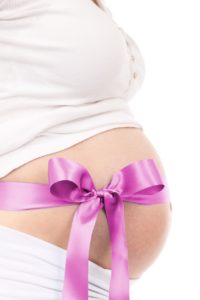
All patients are more than welcome to enjoy comprehensive pregnancy care and supervision at the Medfemina Health Centre. Our pregnancy supervision scheme has been developed based on the recommendation of the Polish, British and American gynaecology and obstetrics associations. Additionally, during each visit, as part of pregnancy supervision in our facility, the doctor will perform a basic ultrasound examination (included in the price of the visit). Extended ultrasound examinations – of the 1st, 2nd, 3rd trimester are performed at appropriate intervals as recommended.
We perform prenatal examinations in accordance with the rules of the FMF (Fetal Medicine Foundation) – learn more by clicking here.
We also perform most of the prenatal testing available on the medical market, a comparison of the available prenatal testing methods can be found in the table by clicking here
Learn more about laboratory tests that should be performed during pregnancy by clicking here.
The diagram of our pregnancy supervision is presented in the table below, it is based on the recommendations of the Polish Gynaecological Society. When supervising a pregnancy in our facility, each patient can be sure that it is carried out according to a scheme analogous to each doctor, in accordance with the latest guidelines and recommendations of scientific societies.
| Examination date | Preventive services and health promotion activities | Diagnostic tests and medical consultations |
|---|---|---|
| done up to 10th week - it is recommended that the first visit takes place between 7th and 8th week of pregnancy | 1. General examination of the patient and medical history. | Mandatory examinations: |
| 2. Speculum and medical examination in the gynaecological chair. | 1. Blood type and Rh. | |
| 3. Evaluation of the pH of vaginal discharge. | 2. Immune antibodies. | |
| 4. Pap smear. | 3. A complete blood count | |
| 5. Blood pressure measurement. | 4. Urinalysis. | |
| 6. Breast examination. | 5. Fasting blood glucose test. | |
| 7. Determination of height and weight. | 6. VDRL | |
| 8. Pregnancy risk assessment. | 7. Ultrasound examination. | |
| 9. Shaping a healthy lifestyle. | Recommended research: | |
| 1. Consultation of a dentist. | ||
| 2. HIV, HCV, toxoplasmosis (IgG and IgM) tests, rubella | ||
| 11th - 14th week | 1. General examination of the patient and medical history. | Mandatory examinations: |
| 2. Speculum and medical examination in the gynaecological chair. | 1. Ultrasound examination. | |
| 3. Blood pressure measurement. | 2. Urinalysis. | |
| 4. Body weight measurement. | Recommended research: | |
| 5. Pregnancy risk assessment. | Testing for genetically determined defects: NT, NB, double test - PAPP-A+bHCG. | |
| 6. Evaluation of the pH of vaginal discharge. | Foetal cffDNA genetic testing in maternal blood from 10-12th week of pregnancy (HARMONY, NIFTY) | |
| 7. Shaping a healthy lifestyle. | ||
| 15th - 20th week | 1. General examination of the patient and medical history. | Mandatory examinations: |
| 2. Gynaecological examination (in the speculum and on the gynaecological chair). | 1. A complete blood count | |
| 3. Evaluation of the pH of vaginal discharge. | 2. Urinalysis. | |
| 4. Blood pressure measurement. | 3. Anti-Rh antibodies. | |
| 5. Body weight measurement. | Recommended research: | |
| 6. Pregnancy risk assessment. | 1. Testing for genetically determined defects (triple test - bHCG, Estriol, AFP). | |
| 7. Shaping a healthy lifestyle | ||
| 21st - 26th week | 1. General examination of the patient and medical history. | Mandatory examinations: |
| 2. Speculum and medical examination in the gynaecological chair. | 1. Glucose test after oral administration of 75 g of glucose (in 24-28th week of pregnancy). | |
| 3. Foetal heart function assessment. | 2. Ultrasound examination. | |
| 4. Blood pressure measurement. | 3. Urinalysis. | |
| 5. Body weight measurement. | Recommended research:: | |
| 6. Evaluation of the pH of vaginal discharge. | 1. In women with negative results in the first trimester - testing for toxoplasmosis. | |
| 7. Pregnancy risk assessment. | ||
| 8. Shaping a healthy lifestyle | ||
| 27th - 32nd week | 1. General subject and physical examination. | Mandatory examinations: |
| 2. Speculum and medical examination in the gynaecological chair. | 1. A complete blood count | |
| 3. Evaluation of the pH of vaginal discharge. | 2. Urinalysis. | |
| 4. Foetal heart function assessment. | 3. Immune antibodies. | |
| 5. Blood pressure measurement. | 4. Ultrasound examination | |
| 6. Body weight measurement | ||
| 7. Pregnancy risk assessment. | ||
| 8. Preparation for childbirth, postpartum, breastfeeding and parenthood | ||
| 33rd - 37th week | 1. General examination of the patient and medical history. | Mandatory examinations: |
| 2. Obstetric examination. | 1. Urinalysis. | |
| 3. Assessment of pelvic dimensions. | 2. A complete blood count | |
| 4. Speculum and medical examination in the gynaecological chair. | Recommended research: | |
| 5. Evaluation of the pH of vaginal discharge. | 1. In the group of women with an increased population risk or individual risk of infection with: VDRL, HIV, HCV. | |
| 6. Foetal heart function assessment. | 2. Culture for β-haemolytic streptococci | |
| 7. Blood pressure measurement. | ||
| 8. Breast examination. | ||
| 9. Body weight measurement. | ||
| 38th - 39th week | 1. General examination of the patient and medical history. | Mandatory examinations: |
| 2. Obstetric examination. | Urinalysis. | |
| 3. Foetal heart function assessment. | ||
| 4. Blood pressure measurement. | ||
| 5. Body weight measurement. | ||
| after 40th week | 1. General examination of the patient and medical history. | Recommended research: |
| 2. Obstetric examination. | Ultrasound examination with the assessment of the weight of the foetus. | |
| 3. Examination in a medical speculum on a gynaecological chair. | Cardiotocography (CTG) examination. | |
| 4. Foetal heart function assessment. | ||
| 5. Blood pressure measurement. | ||
| 6. Body weight measurement. |







 Registration from 8:00 am to 9:00 pm
Registration from 8:00 am to 9:00 pm On-line registration 24/7
On-line registration 24/7